- Home
- P. T. Deutermann
The Last Man Page 36
The Last Man Read online
Page 36
33
Judith saw the helicopter lift off without Gulder and asked Ellerstein where David Hall had gone. Ellerstein nodded at the rapidly disappearing helicopter.
“Yossi!” she exclaimed. “Where are they taking him?”
“Away?” he tried. She stared at him. Gulder had been talking on a small radio set and now ended the call. He walked over to them. “So, Dr. Ressner, tell me in complete detail, please: What have you found down there in that cistern?”
“Not until you tell me where you’ve taken Mr. Hall,” she declared. Some soldiers were standing at the top of the steps, watching them. The morning heat was rising in shimmering waves, distorting the view.
“We’ve taken Mr. Hall to a safe place, Dr. Ressner,” Gulder said. “Until we can sort out the ramifications of what you two have done here.”
“What ramifications?”
“Well, because you chose to speak in English, after I twice asked you to speak in Hebrew, Mr. Hall knows things that he might otherwise not have known. Also, in certain respects, you are responsible for the death of a senior counterintelligence officer. For starters.”
“Mr. Gulder,” protested Ellerstein, but the aide waved him silent.
“Listen to me, Dr. Ressner. Yossi here tells me you have found artifacts from Herod’s Temple in that cave. Is that true?”
“Yes, I believe it is.”
“And there is writing on the walls? The testament of the last Zealot?”
“So it says.”
“Anything else?”
“What appears to be the remains of my husband at the bottom of the cistern,” she said defiantly. “If that matters to you.”
“Yes, yes, I understand that, but I’m talking about antiquities. What else is down there?”
She glared at him again as if he were inhuman. He shook his head impatiently and tried again. “Dr. Ressner,” he said, “I am truly sorry that your husband was killed by that man, but now you’ve wiped that slate clean, yes? So: Now you must see things my way. The government’s way. We must deal with the present, and the present is a gathering avalanche of international media interest even as we stand here talking. You know you will be the most famous archaeologist in the world in about six hours, don’t you?”
“Me? What do you mean?”
“Because we are going to announce these discoveries, immediately, just as soon as the army can either get some divers down here or get the water pumped out of that cistern. Independent confirmation, then announcement.”
“It wasn’t my discovery. It was David Hall—”
“No, it was not, Dr. Ressner,” Gulder interrupted. She looked at Ellerstein, who nodded his head at her. Listen to this man, he was telling her.
“This discovery was made by you, Dr. Yehudit Ressner,” Gulder continued. “After years of solitary study and analysis. The American’s visit was simply an annoyance, which was why you were upset by the requirement to shepherd him around this site. Then he trespassed at night and was invited to leave. He went scuba diving and then went back to America. The American is most definitely not part of this story, Dr. Ressner. You, on the other hand, are the story. Along with the artifacts, of course.”
“But—”
“Yes, I know, we have Mr. Hall in custody. Of course. We will need to debrief him, and then we will send him home, but not until we have established the provenance of these amazing discoveries, in a proper public relations setting, as it were. Now: Tell me in detail, what is down there?”
Bewildered, but not sure what to do about it, she told him about everything they’d found. Gulder’s eyes gleamed when he heard it. An officer called down to them from above that a navy dive team was on the way from Haifa.
“Well, Dr. Ressner: Do you think you could manage to go back down there? One last time? Based on what you’ve said about its size, it may take days to drain that cistern. We need to verify these things immediately.”
“And preserve them,” she said. “The cave must be atmospherically sealed before the water level drops below the entrance. We have no way—”
“Yes, yes, of course, Dr. Ressner,” he said, steering her with his hand on her shoulder toward the steps. “Trust me, we will shortly have more archaeology experts here than there ever were Zealots. First, I think, we need pictures. Now: Yossi, take her up to wait for the dive team’s helicopter. These are military divers, Dr. Ressner. They will take good care of you down there. Trust me, Dr. Ressner.”
As she went with Ellerstein she realized she had not told Gulder about the wine bowl.
34
David completed his one hundredth circuit of the garden cloister and finally sat down, somewhat out of breath. After three weeks, he had not yet entirely acclimated to the altitude. Every time he was brought out to exercise, one of the monks took up station in a corner of the cloister, ostensibly reading a book of prayer. He seemed to pay no particular attention to what David was doing, walking or not walking, but he didn’t leave, either.
The blindfold had come off as soon as they took him out of the helicopter. He was pretty sure that they had landed somewhere up in the Golan Heights, because the truck that had picked him up couldn’t have gone more than a few miles away from the landing site, and most of that had been damn near straight up through snowy mountain ravines. They had taken him to a mountain monastery, through massive wooden gates, and into a bare white stone courtyard, flanked by thick, high walls on two sides and a stone building in front of him. Two very old men in black robes were bobbing at him and smiling a welcome. His Israeli guards took off the plastic cuffs and left without a word through a man-sized metal door embedded in one of the two enormous wooden gates.
David hadn’t known what to do next. The sun was intense, and the air was very thin. He already had a headache, and he wasn’t sure that any of these people spoke English. Then another monk came out into the courtyard, younger, only in his sixties or so, and greeted him in broken English. He took David through the front door of the building, down a short stone corridor with no doors, and out into a garden enclosure surrounded by a columned walkway on all four sides. There was a still fountain in the center, flower beds in four quadrants, and what looked like the entrance to a small chapel on one side. The battered remains of a stone tower rose over one corner of the walls. The monk walked straight across the enclosure and took David into yet another corridor. David noted that there were no lights or any other signs of electricity in the monastery. Finally they came to a plain wooden door at the end of the cross corridor. The monk produced a set of antique keys, unlocked the door, and showed him into a bare room that was about fifteen feet square.
Inside was a single cotlike bed with two blankets, an armoire, a small wooden desk, and a chair. There were two candlesticks, a large enamel pitcher, and a glass on the desk. In one corner was a washbasin, under which there was a chamber pot. There were two tiny windows, embrasured as if for defensive purposes, with small apertures in the room’s wall opening to larger apertures outside. The walls were made of polished stone, and the ceiling was domed in a four-part arch of white tiles.
“You rest now, Mr. Hall,” the monk said in what sounded like a Greek accent. “Water to drink is in the pitcher. Drink much water. Help with the head.”
“What is our altitude here?” David asked, looking out one of the windows, where a stunning view of snow-tipped mountains covered the visible horizon.
“Above the sea? Nearly three thousand meters, Mr. Hall. Rest. Food soon.”
He had had plenty of time to rest for the next few days, because he had not been let out of the room. A package with some of his clothes had arrived the second day. A silent monk brought him two meals a day, simple fare of tea and bread and fruit in the morning and a meal of hot soup, usually vegetable, more bread, and a glass of wine just before sundown. Once a week there was meat, which he was pretty sure was stewed goat. He had tried speaking to the monk, but the man simply put a finger to his own lips and shook his head. When David h
ad pantomimed a book, they brought him a Bible written in Latin. His headache had finally gone away after five days. He had no way to shave, so now he was growing a beard.
There had been no question of escape. The curtain walls were easily eight feet thick, and the windows no more than a foot square. The door was made of old wood that felt like it had turned to stone. The monks got up at first light and went to bed at dark. He had candles but no matches. He had studied some Latin in preparation for the expedition, out of personal interest in Roman siege warfare. Now it seemed he was going to get the chance to learn a lot more Latin. Then Gulder had paid a visit.
He heard the helicopter hammering the mountain air but never saw it. A half hour later, what sounded like the same ancient lorry had come grinding up toward the monastery. They took him to the garden cloister to meet with Gulder, who showed up with the same two stone-faced bodyguards. Gulder had brought a stack of thin newspapers rolled up in a shopping bag.
“These are for you, Mr. Hall,” he had begun. “They are English-language versions of the Jerusalem Post and the Herald Trib. So you can see what has happened with the amazing discoveries at Metsadá.”
“Thank you, Mr. Gulder. Although what I really want to know is how long you plan to keep me imprisoned here.”
“Imprisoned is too harsh a word, Mr. Hall,” Gulder said, sitting down at the other end of the bench, just out of David’s reach should he be inclined to violence. “We have prisons, and they do not have gardens.”
“Same net result. Solitary confinement by any other name…”
“Yes, well. They are treating you all right here?”
“They are treating me just fine, although I could use some exercise and something to read besides a Latin Bible.”
Gulder nodded and tapped the bag of newspapers. “These will help. Yehudit Ressner is now a very famous archaeologist.”
“I can just imagine.”
“Probably you can’t, Mr. Hall. It has been a veritable circus. The whole world is agog.”
“There were scrolls in those holders?”
“Oh, yes, and the holders were sealed with a resin mixture. They are in perfect condition. Of course, the scholars are already arguing.”
David laughed. That fit.
“There was more: Did you notice anything about the bottom of the cistern when you went searching for your equipment?”
“Lots of silt. Oh, yes, it looked like there were bricks lining the bottom.”
“Bricks, indeed. We hoped they’d be solid gold, Mr. Hall.”
“They weren’t?”
“They were not, unfortunately, especially given today’s price of gold. The archaeologists said they were actually worth more than gold. They were testamentary tablets, not bricks.”
“Which are?”
“Each of the tablets had a name. There were nine hundred and eighty names. They think that, once the decision was made, each man was given a tablet, and then the trusted ones took the tablets to the cave. Against the day.”
“Oh, my,” David said. “No longer the Metsadá myth, is it. What about those cylinders?”
Gulder reached into his shirt pocket and extracted a package of cigarettes and a lighter. He offered the pack to David, who shook his head. Gulder lit up, shocking the pristine monastery air. He smiled. It was a sad little smile, and David suddenly realized they had finally come to the heart of the matter.
“Skuratov was telling the truth about the cylinders, as far as he went,” Gulder began. “Our original investigation was triggered by suspicions that someone was diverting small amounts of weapons-grade material. It was actually much worse than that.”
“Worse in what way?”
Gulder described how the government suspected they had diverted enough material for a single weapon. “They had plans for making five weapons, Mr. Hall. Five, not just one.”
“You said earlier they were diverting bomb materials. Were they actually selling plutonium or HEU?”
“No, Mr. Hall,” Gulder said patiently. “They got their money by selling some of the heavy water to Iran through a series of middlemen. The deuterium oxide production system at Metsadá has been there a long time. They simply restarted it. They also needed heavy water to conceal the materials they were accumulating at Dimona. They couldn’t steal both heavy water and fissile materials. They acquired some from other sources, but that cost money, so they then went back to the Metsadá plant.”
“And when it produced much more than they needed, they saw the opportunity to sell it, make money for the other components they’d need.”
“Precisely, Mr. Hall.”
“So they weren’t just facilitating Iran’s bomb—they were working on making some of their own.”
“I think Colonel Skuratov was concerned that the government of Israel might have a failure of nerve when the time came,” Gulder said. “I think these weapons were going to be their insurance.”
David nodded. “I have to tell you, this would be very, very hard to pull off in our uranium fuel production facilities. In a weapons facility, ten times harder.”
“I am told that our own controls would have eventually caught them, except for the fact that they could conceal their ‘stash,’ as it were, using the heavy water as a shield. Hiding that diversion is not that difficult if the right people are involved. Hiding the growing mass of weapons grade material is the problem.”
“So it all came back to the heavy water.”
“Correct, Mr. Hall. So now you know.”
“What happened to the remaining conspirators?”
“Skuratov, of course, is dead, as is Colonel Shapiro.”
“Meant to ask you about that,” David said.
“Shapiro was Skuratov’s number two at Dimona. Impossible that he did not know what was going on. He tried his best to deflect Professor Ellerstein that night. Yossi noticed, told me. He was too dangerous a loose end, so I simply took the opportunity to let him try out the full Zealot experience, too.”
“How about the rest of Skuratov’s cell? You going to shoot them, Mr. Gulder?”
“No, Mr. Hall. We reserve the death penalty for monsters like Adolf Eichmann. No, these people will serve life imprisonment in a special facility down in the Negev Desert. Their nights, anyway. Their days will be spent at Dimona, cleaning up the mess they made. They may become a little ‘hot,’ as they say, but—” He shrugged.
“So why are you telling me all this?”
“Because it doesn’t matter that you know, Mr. Hall.”
David just stared at him until he realized what Gulder was telling him. “Are you going to execute me?”
“No, Mr. Hall, we are not.”
Imprisonment, then, he thought. For life. They were going to just leave him up here, locked up in this monastery, forever. “You can’t get away with this,” he said, clearing his throat, knowing even as he said it that, yes, they probably could. The image of this ice-cold bureaucrat pushing Colonel Shapiro off the wall was still vivid in his mind.
Gulder snubbed out the cigarette. “You violated our hospitality at Metsadá, Mr. Hall. Everyone at the IAA heard about that. You became, how shall we say it, persona non grata, yes? You then went on scuba excursions from your hotel at Tel Aviv, where you and Dr. Ressner became involved in an underwater murder.”
“Involved?” David protested. “I damned near got killed.”
“That’s not what you told the police, though, was it?”
David started to answer and then just swallowed. Gulder smiled again.
“Did you know Colonel Shapiro was an expert scuba diver? Ah, well, it doesn’t matter now, does it. You then took some extra dive tanks from the dive shop. You did not return them. Your rented Land Rover was found mysteriously abandoned, not at Metsadá but on the coast. Your personal effects were left in the hotel room. The assumption is clear: You went diving on your own. An accident. One should never dive alone, isn’t that the rule?”
“People back home aren’t going to
buy that, Mr. Gulder.”
“What people, Mr. Hall? Your missing girlfriend? You have no girlfriend. You never did, actually.”
“What the fuck is that supposed to mean?” David demanded. One of the guards began to stand up when he heard David’s tone of voice, but Gulder motioned for him to sit back down.
“Adrian Draper. How did she feel about your whistle-blowing plans, Mr. Hall? Was she enthusiastic?”
“Quite the opposite,” David said. “She was adamantly opposed. Said it would wreck my career in nuclear power. We had some big fights.”
“That whistle that you were going to blow, that involved heavy water, correct?”
“Correct.”
“Heavy water that was being diverted within your own company. Who else, besides yourself, would have noticed such a thing within your company?”
“Nobody. That was my job. That’s one of the reasons I’d been sent to school, for special training.”
“Where you met Adrian Draper.”
“Yes.”
“Was it a loving relationship, Mr. Hall?” Gulder asked softly. “Were you two planning for babies and a suburban future? Or more like an exciting relationship between two intellectual equals, great sex and fiery battles? Head games and then bed games?”
David, stunned, could only blink. How could this man, this foreigner, know the first thing about Adrian Draper and their all too brief time together? Gulder leaned in, looking David right in the eye.
“Did you ever find out where the heavy water was going, Mr. Hall?”
“No, I didn’t. The company quashed the investigation immediately. Once I got some of our government people into it, like my uncle, I was kept out of the loop.”
Gulder nodded, reached for another cigarette, then apparently decided against it.
“Right after this scandal broke in Washington, Adrian left, isn’t that correct?”
“Yes,” David said. “The Israeli Embassy said she’d been called away on travel. I don’t know if she’s even alive.”
“Oh, but she is, Mr. Hall,” Gulder said. “Alive and well, and back in her own country. She even misses you. A little.”

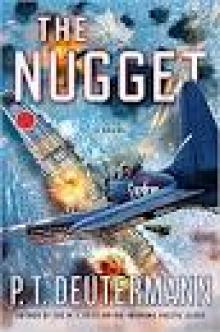 The Nugget
The Nugget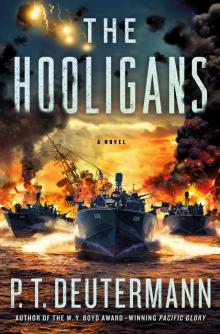 The Hooligans
The Hooligans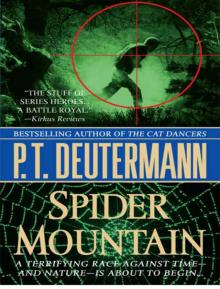 SPIDER MOUNTAIN
SPIDER MOUNTAIN![Cold Frame [retail] Read online](http://i1.bookreadfree.com/i/03/19/cold_frame_retail_preview.jpg) Cold Frame [retail]
Cold Frame [retail] Sweepers
Sweepers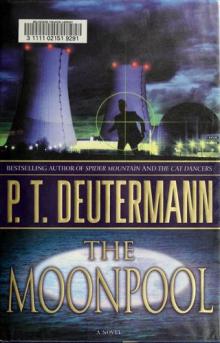 Cam - 03 - The Moonpool
Cam - 03 - The Moonpool Trial by Fire
Trial by Fire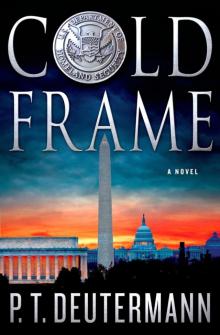 Cold Frame
Cold Frame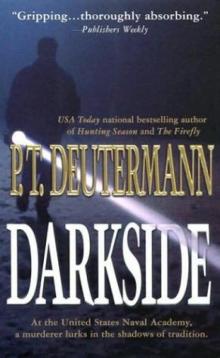 Darkside
Darkside Cam - 04 - Nightwalkers
Cam - 04 - Nightwalkers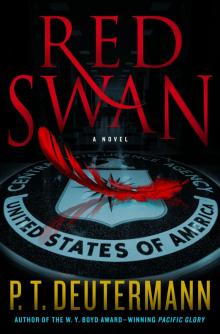 Red Swan
Red Swan The Commodore
The Commodore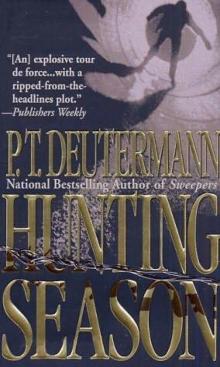 Hunting Season
Hunting Season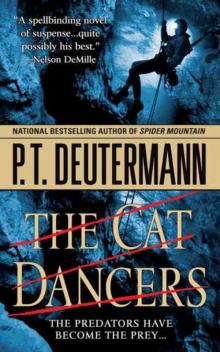 The Cat Dancers
The Cat Dancers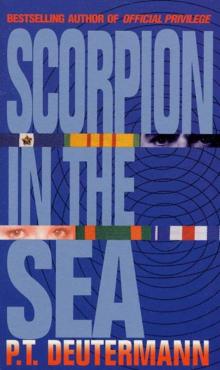 Scorpion in the Sea
Scorpion in the Sea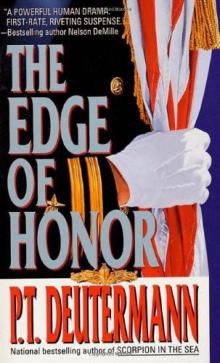 The Edge of Honor
The Edge of Honor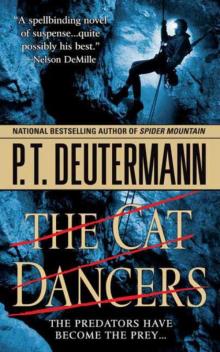 The Cat Dancers cr-1
The Cat Dancers cr-1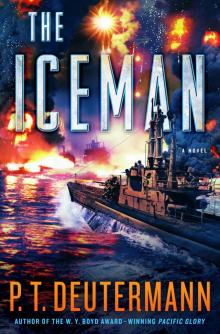 The Iceman
The Iceman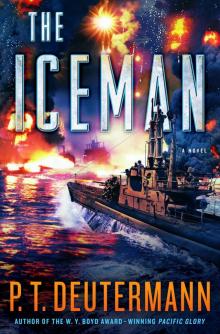 The Iceman_A Novel
The Iceman_A Novel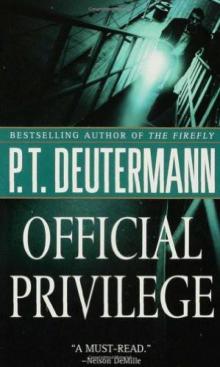 Official Privilege
Official Privilege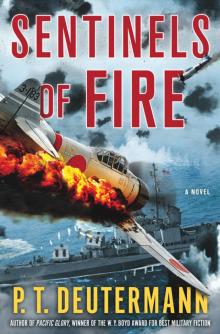 Sentinels of Fire
Sentinels of Fire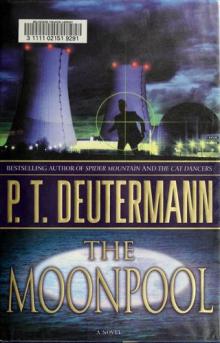 The Moonpool cr-3
The Moonpool cr-3 Nightwalkers cr-4
Nightwalkers cr-4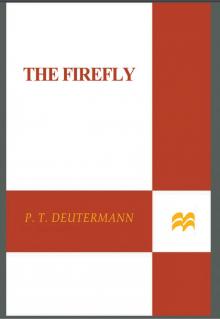 The Firefly
The Firefly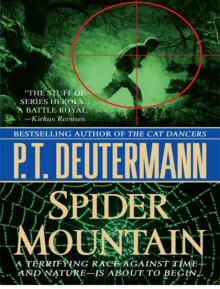 Spider mountain cr-2
Spider mountain cr-2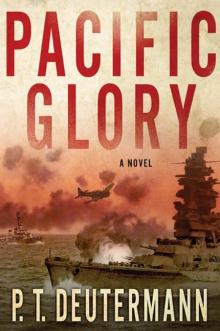 Pacific Glory
Pacific Glory The Last Man
The Last Man